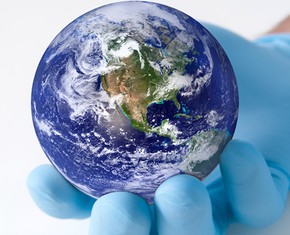The views expressed in our content reflect individual perspectives and do not represent the authoritative views of the Baha'i Faith.
This past summer I met a mother and her teenage daughter from the island nation of Vanuatu, and they told me about their shrinking country.
Sea levels are rising around the world as polar ice melts and the oceans warm, making equatorial archipelagos like Vanuatu particularly vulnerable. Since 1993, scientists say, the Pacific Ocean around Vanuatu has risen an average of 2.5 millimeters each year.
That is not a theory—it is a scientific reality, confirmed by multiple measurement methods. We might be able to ignore or discount as-yet-unproven theories—but we cannot ignore science. To do so, the Baha’i teachings say, would lead us into ignorance and “mere superstition:”
There is no contradiction between true religion and science. When a religion is opposed to science it becomes mere superstition: that which is contrary to knowledge is ignorance.
How can a man believe to be a fact that which science has proved to be impossible? If he believes in spite of his reason, it is rather ignorant superstition than faith. The true principles of all religions are in conformity with the teachings of science. – Abdu’l-Baha, Paris Talks, p. 141.
Because of the rising waters in Vanuatu—and in many other island nations—coastal villages and farming communities have already been forced to relocate to higher ground. In 2005, the United Nations declared the hundreds of inhabitants of the village of Lataw (or Lateau) on the Torres Islands in Vanuatu to be the Earth’s first climate refugees. Their coconut palm plantations had died from saltwater flooding, and the sea washed houses away. As the sea rose, the coastline of the island eroded two to three meters a year.
Support from the Vanuatu government and aid from Canada managed to move and relocate the entire village to escape the rising ocean. Now, the Australian government has assisted Vanuatu in preparing a website that scientifically projects which littoral regions of Vanuatu will be inundated by rising sea levels, and when.

My friends from Vanuatu told me that everyone who lives there believes climate change is real, because they’ve seen its effects firsthand.
The example of Lataw in Vanuatu, many scientists believe, is a canary in the coal mine of modern life—an early warning to all humanity. Because a large percentage of the Earth’s population lives near a coastline, and three-quarters of the world’s largest cities are by the sea, the gradual rise in sea levels should concern us all.
The scientific consensus has shown that our planet’s seas are rising because for two centuries, since the beginning of the Industrial Revolution in the early 1800s, we have made most of the world’s power and much of its material progress by tapping into underground energy resources. Burning coal, oil, and natural gas has provided the main source of our energy for more than two hundred years—but we now know that the carbon those fossil fuels emit has altered the Earth’s climate and heated its oceans. All of these effects will grow much worse if we don’t significantly moderate, reduce and then phase out our consumption of carbon-producing fossil fuels.
So how can we reliably provide the power the world needs, while we effectively address the major environmental problems caused by burning fossil fuels, and also avoid the next oil-related war? Do we have the ability to run our power-driven modern world with better energy sources?
The Baha’i writings provide two clear answers to those important questions:
A world federal system, ruling the whole earth and exercising unchallengeable authority over its unimaginably vast resources, blending and embodying the ideals of both the East and the West, liberated from the curse of war and its miseries, and bent on the exploitation of all the available sources of energy on the surface of the planet, a system in which Force is made the servant of Justice, whose life is sustained by its universal recognition of one God and by its allegiance to one common Revelation—such is the goal towards which humanity, impelled by the unifying forces of life, is moving. – Shoghi Effendi, The World Order of Baha’u’llah, p. 204.
One federated world community, the Guardian of the Baha’i Faith wrote, could exercise its global authority over the Earth’s resources, regulating their extraction, their use and the pollution they produce. Also, notice that Shoghi Effendi said that future world commonwealth would exploit “all of the available sources of energy on the surface of the planet” rather than “below the surface.”
Each hour of each day the surface of our Earth receives enough sunshine to supply all of humanity’s energy needs for a year. The United Nations Development Programme has found that the annual potential of power generation from solar energy amounts to as much as 49,387 exajoules—almost a hundred times more than the total annual energy consumed on the entire planet, 559.8 exajoules.
The International Energy Agency projects that by 2050, solar power will potentially contribute more than a quarter of all worldwide electricity consumption. Solar energy would then represent the world’s largest source of electricity. Along with other surface-generated energy sources—wind, the ocean’s waves, hydroelectric power from flowing water—we now have the knowledge, the technology and the spiritual insight to transform our Earth from a belching, polluting 19th Century industrial smokestack to a clean, renewable 21st Century solar array or wind farm.
The Baha’i teachings encourage us not only to unite as one human race, but to become wise, future-oriented stewards of the Earth:
While the world of nature stands in need of development, man’s approach to such development must be tempered by moderation, a commitment to protecting the “heritage [of] future generations”, and an awareness of the sanctity of nature that pervades the Writings of the Baha’i Faith. – from “Conservation of the Earth’s Resources,” compiled by the Research Department of the Universal House of Justice, which quotes Shoghi Effendi, from a cable dated 23 May 1951 to the New Earth Luncheon, London, U.K.
We can do all that by utilizing God’s gift to all humanity, the enormous, everlasting power of the sun:
And may you remember that a single infinitesimal atom in the ray of the sun through a shining beam of the solar energy becomes glorified and radiant. – Abdu’l-Baha, The Promulgation of Universal Peace, p. 420.
…all the earth’s creatures require the bounty of the sun, for their very existence is dependent upon solar light and heat. – Abdu’l-Baha, Selections from the Writings of Abdu’l-Baha, p. 50.
The sun nurtures all earthly things and fosters their growth and development by its heat and light—what greater good is there than this? – Abdu’l-Baha, Some Answered Questions, newly revised edition, p. 350.
You May Also Like
Comments

















That the natural forces that were causing the sea level to rise for 15,000 years have now become ineffectual is the superstition.
That the 3% of the Earth’s annual output of carbon dioxide that comes from human activity has become 100% responsible for the continuation of sea level rise is the superstition.
The idea that if human beings stopped burning hydrocarbons for energy then the sea level would stop rising is the superstition.
How ironic that you ...are using the Bahá'í Writings, which discourage belief in superstitions, to assist in the promulgation of popular modern-day superstitions.
Absolutely! Keep calm cause everything is possible for him who believes.